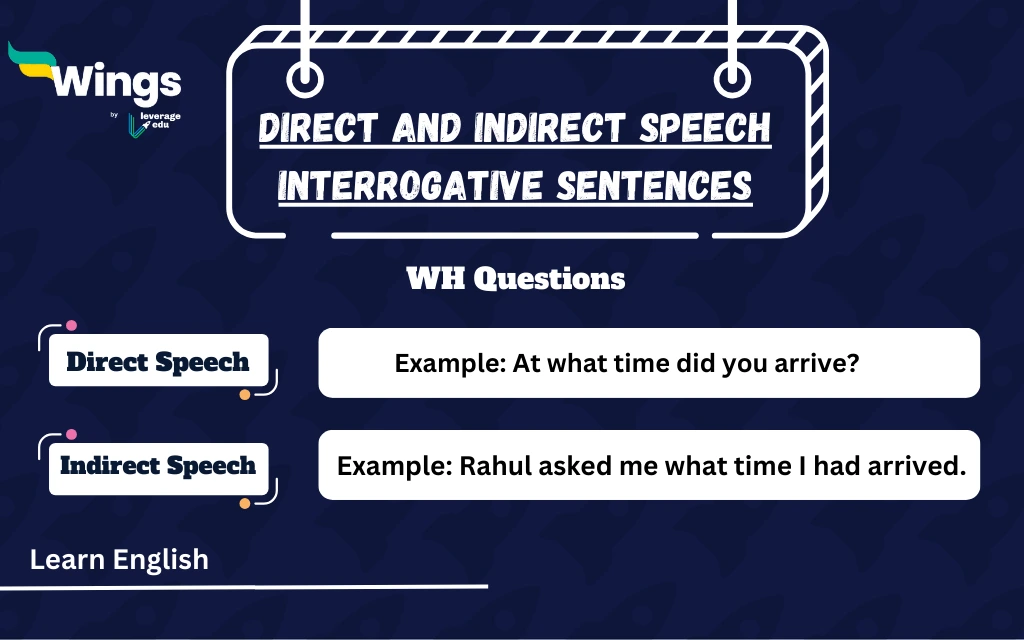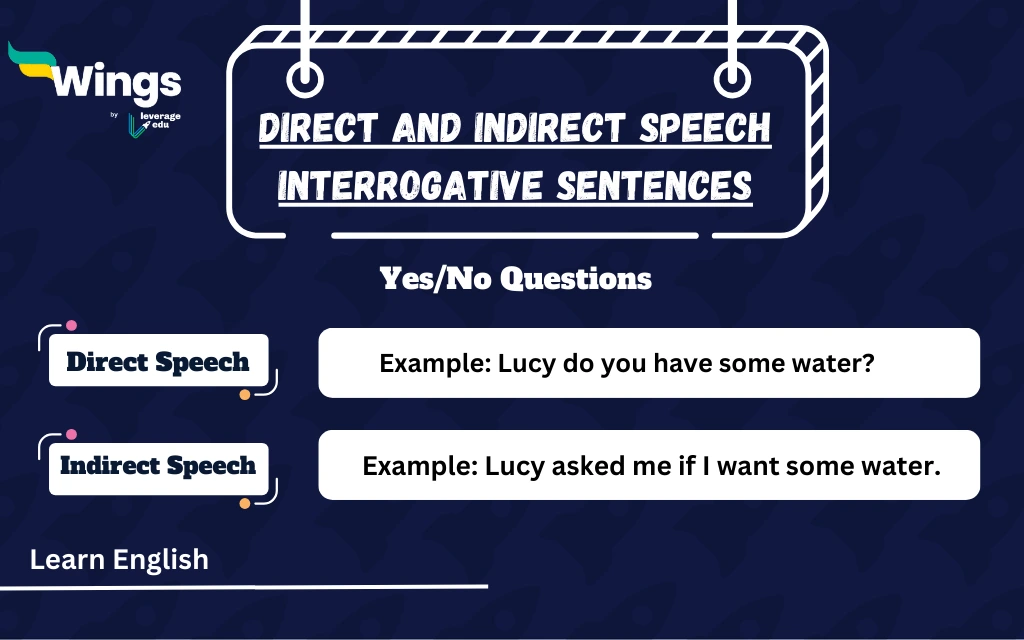50 examples of direct and indirect speech interrogative sentences: Effective communication involves both understanding and the ability to convey questions clearly and coherently. In this blog post, we will learn about the rules of transforming interrogative sentences from direct to indirect speech. This skill is important as it helps to maintain the flow of conversations and narratives. It adds finesse to language proficiency. Continue reading the blog article below to learn more about 50 examples of direct and indirect speech interrogative sentences.
This Blog Includes:
- Understanding Direct And Indirect Speech of Interrogative Sentences
- Rules For Changing Interrogative Sentences into Indirect Speech
- 50 Examples of Change of Interrogative Sentences from Direct to Indirect Speech
- Quick Practice Exercise
- Exercises to Practise Direct and Indirect Speech Interrogative Sentences
- FAQs
MUST READ! Reported Speech: Definition, Rules, Usage with Examples, Tips, Exercises for Students
Understanding Direct And Indirect Speech of Interrogative Sentences
Interrogative sentences are generally used to ask a question to gather some information.
Direct Speech Interrogative Sentences
In direct speech, the actual words spoken by the speaker are enclosed in quotation marks. Whenever you form questions using direct speech, it is important to make note of the actual words spoken and punctuation.
For example:
Example 1: He asked, “Where are you going”?
Example 2: She asked,” Did you finish your homework”?

Indirect Speech Interrogative Sentences
In Indirect speech, the questions are not quoted in quotation marks as they are not the actual words of the speaker, whereas the speaker tries to quote the meaning of someone else’s words. Transformation of sentences from direct speech to indirect speech involves several changes, such as a change in the verb form, the removal of quotation marks, an alteration in pronouns, and a change in word order.
For example:
Example 1: He asked where I was going.
Example 2: She asked if I had finished my homework.

Also Read Tenses Rules: Charts, Examples, Types [PDF Available]
Rules For Changing Interrogative Sentences into Indirect Speech
One must follow these rules while changing direct speech interrogative sentences to indirect speech
Rule 1: The Reporting Verb is changed to ask, inquire, or wonder according to the sentence.
Rule 2: The question mark is removed, thus changing the interrogative form of the sentence to an affirmative sentence. This is done by placing the subject before the verb, and if a sentence starts with a helping verb, such as do or did they are removed in indirect speech.
Rule 3: If the sentence begins with the word ” who ” or words such as where, how,. Then we will not use any conjunction in the indirect speech for conversion.
Rule 4: If the sentence begins with the helping verbs such as do, did, have, etc., then the conjunctions “if “ or “whether” are used to transform it into indirect speech.
Must Read: Subject-Verb Agreement: Definition, 12 Rules & Examples
50 Examples of Change of Interrogative Sentences from Direct to Indirect Speech
Read the following examples thoroughly to know the changes made while converting direct to indirect speech.
| Direct Speech | Indirect Speech |
| He said to him,” Do you live in Chandigarh?” | He asked him if he lived in Chandigarh. |
| She said to her mother “Are you going to school tomorrow?” | She asked her mother if she was going to school the next day. |
| The professor said to me “ Did you come late today?” | The professor asked me if I came late the same day. |
| My mother said to me,” What do you want?” | My mother asked me what I wanted. |
| The teacher said to Ram,” Where are you going?” | The teacher asked Ram where he was going. |
| She said to my sister,” Will you take tea?” | She asked my sister if she would take tea. |
| My brother said to me,” Do you like horror films?” | My brother asked me if I liked horror films. |
| He said to me,” Do you live here?” | He asked me if I lived there. |
| She said to her mother “Where are you going?” | She asked her mother where she was going. |
| She said to her friend,” Are you coming to the party?” | She asked her friend if she was coming to the party. |
| She said to her father,” What time does the train leave?” | She asked her father what time the train left. |
| She said to her sister,” Are you joining us for lunch?” | She asked her sister if she was joining them for lunch. |
| My mother said to my friend,” Where do you live?” | My mother asked my friend where she lived. |
| My friend said to me,” Have you visited the museum?” | My friend asked me if I had visited the museum. |
| My brother said to me,” Are you enjoying the book?” | My brother asked me if I was enjoying the book. |
| My maid said to me,” What time is your flight?” | My maid asked me what time my flight was. |
| My father said to me,” Did you receive the mail?” | My father asked me if I had received the mail. |
| She said to him,” Have they arrived?” | She asked him if they had arrived. |
| They said to me,” Can you swim?” | They asked me if I could swim. |
| He said to me, Why did you choose this restaurant?” | He asked me why I had chosen that restaurant. |
| She said to me,” Do you buy a new car?” | She asked me if I bought a new car. |
| He said to his friend,” Will you help me with this project?” | He asked his friend if he would help him with that project. |
| She said to him “Did she call you?” | She asked him if she had called him. |
| My mother said to me,” Is it raining outside?” | My mother asked me if it was raining outside. |
| The host said to the organizer,” Who is coming to the event?” | The host asked me who was coming to the party. |
| The boss said to the employee,” Why are you late for the meeting?” | The boss asked the employee why was he late for the meeting. |
| My sister said to me,” Are they planning a surprise?” | My sister asked me if they were planning a surprise. |
| My friend said to me, “ Can I borrow your pen? | My friend asked me If I could borrow her pen. |
| She said to her friend,” Have you ever been to Paris?” | She asked her friend if she had ever been to Paris. |
| She said to her friend,” Did you watch a new movie?” | She asked her friend if she had watched a new movie. |
| My mother said to me,” Have you finished your project?” | My mother asked me If I had finished my project. |
| My father said to me,” Have you seen my keys?” | My father asked me if I had seen his keys. |
| My friends said to me,” Is he coming with us?” | My friends asked me if he was coming with us. |
| The boss said to me “Will you attend the meeting” | The boss asked me if I would attend the meeting. |
| My teacher said to me,” Did you understand the instructions?” | My teacher asked me if I understood the instructions. |
| My parents said to me,” Will they attend the meeting” | My parents asked me if they would attend the meeting. |
| My friend said to me” Can I play the guitar?” | My friend asked me if she could play the guitar. |
| My friend said to me,” Have you met my brother?” | My friend asked me If I had met his brother. |
| Her brother said to him “ Do you like ice cream?” | Her brother asked him if he liked ice cream. |
| I said to my father,” Are we going on vacation?” | I asked my father if they were going on vacation. |
| My friend said to me,” Have you read this book?” | My friend asked me if I had read that book. |
| My brother said to me,” Did you pass the exam” | My brother asked me if I had passed the exam. |
| My coach said to my brother,”Will you join the tennis team?” | My coach asked my brother if he would join the tennis team. |
| The old man said to me,” Is the mall open on Sunday?” | The old man asked me if the mall opened on Sunday. |
Must Read: Figures of Speech: Types, Usage & Examples [Download PDF]
Quick Practice Exercise
Change these into indirect speech:
- She said, “Do you like tea?”
- He said, “Where are you going?”
- Riya said, “Have you seen my phone?”
- The teacher said, “Why are you talking?”
- He said, “Will you help me?”
Answers
- She asked if I liked tea.
- He asked where I was going.
- Riya asked if I had seen her phone.
- The teacher asked why we were talking.
- He asked if I would help him.
Exercises to Practise Direct and Indirect Speech Interrogative Sentences
Also Read: 15+ Active and Passive Voice Exercises With Answers For Competitive Exam
Interrogative sentences are a common part of everyday communication, and knowing how to change them from direct to indirect speech is an essential grammar skill. By understanding the key rules, such as using asked instead of said, adding if or whether for yes/no questions, keeping the wh-word for information questions, and changing the tense correctly, students can easily convert questions into reported speech.
Practising with different examples, like the 50 interrogative sentences given above, helps build confidence and accuracy. Once you master these patterns, you will find it much easier to use reported speech correctly in exams, writing tasks, and daily conversations. Keep practising, and this topic will soon become simple and natural for you.
FAQs
Reported speech, often known as indirect speech, means conveying someone else’s words or thoughts without quoting them directly.
In reported speech, interrogative sentences are changed by changing the question word order, omitting the question mark, and using appropriate conjunctions.
Indirect speech is what a speaker said without using their exact words. We change the tense, pronouns, and time references.
Example: He said that he was going to the market.
Direct speech is when we report the exact words of a speaker. We use quotation marks to enclose the speaker’s words.
Example: He said, I am going to the market.
To convert a sentence from direct speech interrogative sentence to indirect speech, you must follow these steps:
Change the reporting verb
Remove the quotation marks.
Change the tense of the verb in the reported speech
Change pronouns and time references as necessary
Use appropriate conjunctions like “if,” “whether,” or interrogative words like “who,” “what,” “why,” “where,” “when,” or “how.”
If the verb in direct speech is in the future tense, it is usually changed to the past tense in indirect speech.
Direct: She said, “I will go tomorrow.”
Indirect: She said that she would go the next day.
LEARN MORE ABOUT REPORTED SPEECH
This was all about “50 examples of direct and indirect speech interrogative sentences.” To advance your grammar knowledge and read more informative blogs, check out our Learn English page and don’t forget to follow Leverage Edu.


 One app for all your study abroad needs
One app for all your study abroad needs












 60,000+ students trusted us with their dreams. Take the first step today!
60,000+ students trusted us with their dreams. Take the first step today!
2 comments
Thank you for the detailed explanation Amanpreet Kaur mam
Hey, Ayushi Dhar Chowdhury
Glad you liked our blog post. If you are interested in reading more such articles you can visit our Learn English page. You will find artiles related to: antonyms, clauses, idioms, parts of speech, phrases, proverbs, punctuation, and synonyms